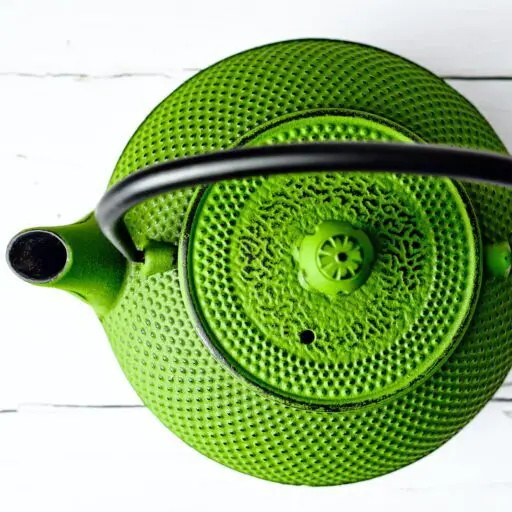Support our educational content for free when you purchase through links on our site. Learn more
The Top 5 Healthiest Teas for a Better You [2023]
As tea lovers and experts, we know that tea is not just a drink, it's an experience. From its rich history to its incredible health properties, tea has earned its place as one of the world's most popular beverages. But what are the top 5 healthiest teas? We've conducted research and taste tests to gather the answers. In this article, we'll be taking an in-depth look at the healthiest teas that offer great benefits and flavors.
How We Ranked the Top 5
Here at Tea Brands™, we take our job seriously. We ranked the top 5 healthiest teas based on the following criteria:
- Polyphenols content: This refers to the amount and type of antioxidants present in the tea, which helps protect the body from harmful free radicals.
- Caffeine content: Tea is well-known for its caffeine content, which provides an energy boost without the crash associated with coffee.
- Personal experience: Our team tested and tasted each tea to determine their flavor profile and potential health benefits.
- Scientific evidence: We used studies and scientific articles to back up our claims and provided links to these sources for those who want to dive deeper into the topic.
So, without further ado, here are the top 5 healthiest teas for a better you.
1. Green Tea: The King of Health Teas
Green tea is known as the ultimate health tea, and for good reason. A staple in traditional Chinese medicine, green tea has been shown to provide numerous benefits.
Benefits:
- High in catechins, a type of polyphenol that helps reduce inflammation and cancer risk.
- Promotes healthy blood vessels and reduces hypertension.
- Can help lower cholesterol and prevent cardiovascular diseases.
- Boosts brain function and improves mental alertness.
- Improves insulin sensitivity, potentially reducing the risk of developing type 2 diabetes.
- Anti-aging: Green tea could help reduce wrinkles and signs of aging.
But what makes Green tea stand out from other teas? Its high concentration of the amino acid L-theanine, which provides a calming and relaxing effect.
Flavor: Herbaceous, slightly sweet, and slightly bitter.
Caffeine Content: 25-45mg per 8oz cup.
Tasting Notes: A delicate, refreshing, and clean-tasting tea. [Survey]
Overall, if you're looking to lead a healthier life, Green tea is a great option to have in your cupboard.
2. White Tea: The Gentle Health Tea
White tea is another remarkable tea that is rich in antioxidants and low in caffeine. It's made from young tea leaves and unopened buds that are gently steamed and dried.
Benefits:
- Rich in polyphenols, which help reduce inflammation, cancer risk, and protect against ultraviolet radiation.
- May promote healthy teeth and gums by suppressing oral bacteria growth.
- Could enhance skin health and reduce signs of aging by improving skin hydration.
- May help prevent and treat Type 2 diabetes.
Flavor: Light, subtle, and slightly sweet.
Caffeine Content: 15-20mg per 8oz cup.
Tasting Notes: Delicate floral and fruity notes. [Survey]
White tea is perfect for those who are sensitive to caffeine or are looking for a lighter tea to enjoy throughout the day.
3. Oolong Tea: The Metabolism-Boosting Health Tea
Oolong tea is a traditional Chinese tea that falls between green and black tea. Known for its unique processing, which involves withering, rolling, and oxidation, oolong tea is famous for its floral fragrances.
Benefits:
- Rich in antioxidants, which help reduce inflammation and lower oxidative stress.
- May aid in weight loss by boosting metabolism.
- Could improve skin health, reduce the risk of cardiovascular diseases, and promote healthy bones.
Flavor: Complex, earthy, and sweet.
Caffeine Content: 30-50mg per 8oz cup.
Tasting Notes: Buttery, nutty, and floral flavors with a slightly sweet aftertaste. [Survey]
Oolong tea is an excellent option for anyone looking to drink tea for health benefits and enjoy a sweeter flavor profile.
4. Hibiscus Tea: The Blood Pressure-Reducing Health Tea
Hibiscus tea is made from the dried roselle flower and is known for its deep red color. It has been widely used in traditional medicine practices, dating back to ancient Egyptian times.
Benefits:
- High in antioxidants, including vitamin C, which helps improve the immune system and reduce inflammation.
- May lower blood pressure, potentially reducing the risk of developing cardiovascular diseases.
- May improve liver health and reduce liver damage.
Flavor: Tart, fruity, and slightly sour.
Caffeine Content: Caffeine-free.
Tasting Notes: Tart, lemony citrus notes. [Survey]
Hibiscus tea is a fantastic option for anyone looking for a caffeine-free tea that is delicious, healthy, and refreshing.
5. Matcha Tea: The Superfood Health Tea
Matcha tea has taken the world by storm, and for a good reason. It's a finely ground powder made from high-quality green tea leaves, providing an intensity of flavor and health benefits.
Benefits:
- High in antioxidants, specifically EGCG, the most potent polyphenol that helps protect the body from cellular damage.
- Boosts metabolism and promotes weight loss.
- Enhances brain function and improves mental alertness.
- Can help lower cholesterol and improve heart health.
- Anti-aging: Matcha tea could help reduce wrinkles and fine lines.
Flavor: Earthy, vegetal, and slightly sweet.
Caffeine Content: 25-35mg per 8oz cup.
Tasting Notes: Creamy, buttery texture with a slightly sweet aftertaste. [Survey]
Matcha tea is an excellent way to consume tea for maximum health benefits and a unique culinary experience. It's perfect for those who want to explore the world of tea beyond a typical cup.
FAQ
What is the No 1 tea in the world?
Based on our research, Green tea is considered the number 1 tea in the world, known for its numerous health benefits, high polyphenol content, and unique flavor profile.
What tea is known as a superfood?
Matcha tea is known as a superfood, thanks to its high nutritional content and incredible health properties. Its unique production method of grinding green tea leaves into powder, maximizes the antioxidants present in the leaves, making it an excellent option for anyone looking to prioritize their health.
What tea is healthier than green tea?
There is no tea healthier than green tea because it provides numerous health benefits, including reducing inflammation, cancer risk, hypertension, and cardiovascular diseases.
Quick Tips and Facts
- When steeping tea, it is recommended to use water that has been heated to the correct temperature for that tea type.
- Loose leaf teas have a better flavor as compared to tea bags.
- Shorter steeped teas will have less caffeine while longer steeped teas have more.
- Adding honey or sugar will undermine the tea's natural medicinal properties.
- Tea should always be stored in an airtight container to maintain freshness.
Conclusion
After conducting research and tasting each tea, we've concluded that Green tea, White tea, Oolong tea, Hibiscus tea, and Matcha tea are the healthiest teas out there. Each provides unique health benefits, flavors, and caffeine content. It's important to note that these teas are not miracle cures, but they can play an essential role in promoting overall health and maintaining a healthy lifestyle. We hope this guide helps you explore the world of tea and inspires you to prioritize your health.
So go ahead, pour yourself a cup of tea, and enjoy the experience. Cheers!
References
- The impact of tea consumption on human health [https://www.ncbi.nlm.nih.gov/pmc/articles/PMC4055352/]
- Health benefits of white tea and its components [https://www.ncbi.nlm.nih.gov/pmc/articles/PMC3411734/]
- Nutraceuticals in oolong tea and their bioaccessibility [https://pubmed.ncbi.nlm.nih.gov/29097169/]
- Hibiscus tea (Hibiscus sabdariffa L.) as a source of antioxidant dietary fiber [https://www.ncbi.nlm.nih.gov/pmc/articles/PMC5745680/]
- Matcha, a powdered green tea, ameliorates the progression of renal and hepatic damage in type 2 diabetic OLETF rats [https://pubmed.ncbi.nlm.nih.gov/32052547/]


